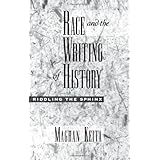
Average Reviews:

(More customer reviews)Maghan Keita has written an extremely informative and concise introduction to the collapse of Eurocentrism and the resulting exposure of the raw anti-African racism that lurks beneath tons and tons of scholarly jargon. For too long African history has been the exclusive preserve of white writers and white scholars(drenched in Eurocentrism) of African history. Of course white scholars have always had their "negro" colleagues who supported the Eurocentric worldview and the Eurocentric intellectual paradigms. Mr. Keita explores and summarizes their views(Snowden, Early, Gates,Mudimbe,Appiah, etc).
Scholars who refuse to accept the "authority" of Western Academic dogmas are ,at last, given a fair hearing. What exactly is Asante saying? What is Obenga saying? What are Diop's main ideas presented without distortions?
Mr. Keita cuts through the rhetoric and arrives somewhere near the core of the problems encountered in trying to understand and write about the most ancient human past- the ancient African past!
Western scholars have deliberately muddied the waters with the historical dogmas of Hegel, Junker,Erman and with: A group, B group, C group, hamitic theories, dynastic race theories, Mediterranean race,"true negro theories, red race, jumbled linguistic theories: Afro-Asiatic, mixed language family myths,biblical mythology, personal opinions, etc,etc.... The racism of white scholars are said not to have effected their scholarship. Even Junker, Breasted, Hegel, Kant,Reisner,Petrie,Lefkowitz, Erman, Maspero, Wilkinson, Ian Shaw-just to name a few!!! Mr. Keita handles this with great skill.
After creating untold confusion among lay people and even specialist with: Karat Group, Developed Abkan, terminal Abkan , Early A group, Classic A, Terminal A, Naqada,l,ll,lll,Kerma, phase ll/a Classic C-Group,Dynastic race theories,"true negro" theories,"hamitic negro theories",migration theories and the like, Eurocentric scholars have not been able to obscure or escape the Black African reality of "ancient Egypt" by seeking refuge in Jan Assmann-like abstractions. Even Reisner had to recognize the black African reality of the "ancient Egyptian" people and civilizations(Egypto-Nubian cultural complexes, both Nilotic and non Nilotic Black African cultures).
Quoting Dubois, Keita writes that Reisner "conceded that Egyptian civilization was from the south" and "from the black tribes of Punt". And that "Egypt and Lower Nubia" were "culturally and racially one land"(p.79). Of course Reisner asserted that a mysterious race of whites appeared(from where is not clear) passed on their advanced culture to the black Africans then vanished. Reisner fails to answer why this mysterious white race did not build a civilization before arriving near the heart of Africa along the banks of the Nile. Here we can detect the similarities between standard Eurocentrism and its extreme manifestation best demonstrated by the Nazi historical efforts. The differences are more of degree and emphasis. The premise is the same.
Keita documents his effort very well. The index is great. The range of Keita's view is comprehensive.
If one wants to understand what African scholars are saying about the history of Africa Keita's book is a great starting place.
Well worth the money. Packed with solid scholarly information!
Click Here to see more reviews about: Race and the Writing of History: Riddling the Sphinx (Race and American Culture)
Despite increased interest in recent years in the role of race in Western culture, scholars have neglected much of the body of work produced in the nineteenth and twentieth centuries by black intellectuals. For example, while DuBois' thoughts about Africa may be familiar to contemporary academics, those of his important precursors and contemporaries are not widely known. Similarly, although contemporary figures such as Martin Bernal, Molefi Assante, and other "Afrocentrists" are the subject of heated debate, such debates are rarely illuminated by an awareness of the traditions that preceded them. Race and The Writing of History redresses this imbalance, using Bernal's Black Athena and its critics as an introduction to the historical inquiries of African-American intellectuals and many of their African counterparts. Keita examines the controversial legacy of writing history in America and offers a new perspective on the challenge of building new historiographies and epistemologies. As a result, this book sheds new light on how ideas about race and racism have shaped the stories we tell about ourselves.

0 comments:
Post a Comment